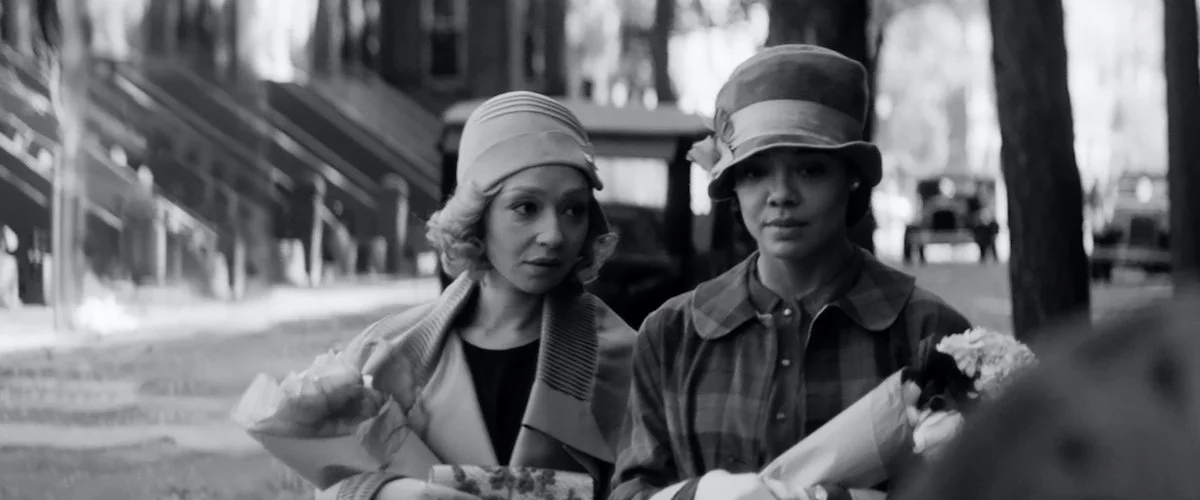
Clare’s Obsession To Possess Blackness On Demand In Passing
by DarkSkyLady
Passing has Tessa Thomspon and Ruth Negga brilliantly portray Irene and Clare in a film about two friends who run into each other years later. The film will feel reminiscent of other films (Moth Diaries, Hitchcock films) in moments; however, the dialogue and the acting pull it above many others. The acting between both Tessa Thompson and Ruth Negga as Irene and Clare is sensational and Ruth Negga, in particular, gives an Oscar-worthy performance with her expressive acting. The ability to use emotions to give subtext underneath a scene’s dialogue with such restraint, save for the eyes was entrancing. André Holland as Brian also gives a compelling performance. Direction and the use of black and white to film elevate every scene, glance, and touch as the lack of vibrant colors forces the audience to focus on the characters. But the lack of a full understanding of director Rebecca Hall’s heritage—particularly how colorism harms people with darker skin, and her inability to fully explore the intricacies of race and skin color, leaves her film a beautifully rendered, unfulfilled promise. Someone with lived experience as someone noticeably mixed or Black would have been better equipped to delve into these weighty topics while Hall veers away from what she can’t comprehend.
The surface, the appearance as so many are passing as something they are not is pervasive throughout. All these types of passing are touched on. Passing as straight, given the passion between Irene and Clare as they hold hands briefly at a party, or when Irene races to comfort Clare. Passing for love, as this is obsession rather than love and Clare’s need to ingratiate herself into Irene’s life is both uncomfortable and increasingly unwelcome to Irene. Clare uses her charm to pass through white or Black society, and she enchants both. Interestingly, the only one who sees through it without anger is the older white writer Hugh. Perhaps because while he is in Clare’s orbit, he is not necessarily in her sights. Even Irene’s husband, Brian as well as her children, soon become charmed by Clare to the degree that Clare becomes the preferred woman for them to have around. While Irene begins to suspect that Clare wishes to take over her life, the truth is murkier than that but no less harmful.
Clare’s behavior demonstrates a passion that isn’t love, but borders on an obsessive need to possess Irene. No different than a relationship where one person’s world revolves around another, but that person has a world outside of the relationship. A movie it brings to mind is The Moth Diaries and Ernessa’s need to possess Rebecca to assuage her loneliness leads Ernessa to charm those around Rebecca so Rebecca herself is left isolated. So Clare effectively drives a wedge between Irene and everyone else as when Clare is near, Irene becomes invisible. The need for possessing Irene doesn’t solely stem from the passion their combined looks and touches convey; there is also a passion for what Irene represents for Clare; a closer attachment to being Black. If she has Irene, she can possess that part of herself she rejects. She latches onto Blackness when her life feels empty or she needs excitement. She exotifies her own people, the same way white people exotify Black people. This obsession while keeping the safety net of white privilege, does more harm than good for everyone because there’s an unwillingness to engage honestly. When Clare boldly declares if her husband discovered she was Black, she would live with Irene, Irene doesn’t see any reprieve in sight.
